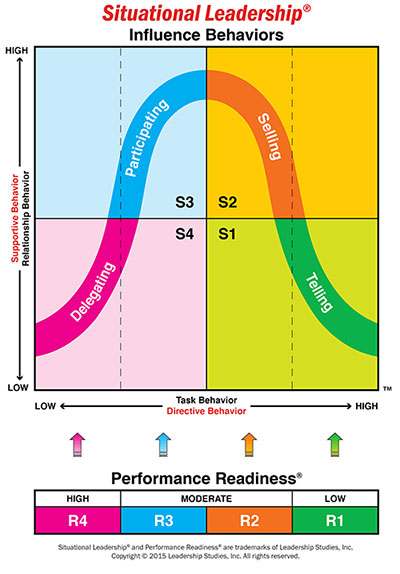
There are many different qualities that can contribute to being a great leader, however, there is no single “best” leadership style to follow. The most effective leaders willingly adapt their style to the situation to influence a successful outcome.
The Situational Leadership® model was developed in the 1970s by behavioural scientist Paul Hersey and author Ken Blanchard. It is arguably the most recognised and utilised tool in the history of the behavioural sciences, serving as a framework to analyse each situation based on the following:
• Amount of guidance and direction (task behaviour) a leader gives
• Amount of socio-emotional support (relationship behaviour) a leader provides
• Readiness level that followers exhibit in performing a specific task, function, or objective

The Situational Leadership® model equips leaders with the ability to identify the best-suited style to adopt based on the situation and the follower’s readiness to undertake a specific task. Blanchard and Hersey outlined four leadership styles that can be applied depending on the situation.
Style 1 - Telling - The leader defines the tasks and supervises followers. This is useful when the follower is inexperienced with lower levels of readiness to undertake a task.
Style 2 - Selling – A practical approach when tackling situations whereby the individual does not possess the capability to complete a task, however, is willing to attempt it. The most appropriate style to adopt in this instance is to explain and coach the individual into what you believe to be the right way of completing a task.
Style 3 - Participating - In a situation where a person possesses the ability to complete a task but is unwilling or insecure in the situation, it’s argued that this is the best style to adopt. Participation is encouraged to help the individual complete the task.
Style 4 - Delegating – If the leader feels confident the follower is able and willing to complete a task, this approach can be highly effective. It’s suited to an experienced employee who has the competence to set their own processes required to accomplish specific tasks.
How Can Adapting to New Situations Influence a Successful Outcome?
1. Positively influences productivity
Managing diverse teams with different levels of experience can be challenging for any leader, but it’s much easier when you are agile in your approach – adopting the most effective style “in the moment”. For example, a leader may let a high performer take complete control of their own project, empowering them to make their own decisions, whilst an inexperienced team member lacking confidence will require more guidance and support. By creating a more comfortable environment for team members, the leadership style implemented will match their needs, make them feel more comfortable, and positively impact workplace productivity.
2. Build trust and strong relationships
Successful leaders enter each organisational context by listening and communicating effectively. By leveraging your active listening skills, you can foresee the challenges ahead and customise your leadership style to meet everyone’s needs.
3. Shift towards higher performance
Offering support for employees based on their needs can build morale, confidence and determination among team members. The relaxed approach a situational leader employs with highly skilled and committed workers can motivate other employees (who are less confident or experienced) to work to their full potential, elevating your company’s performance.
4. Respond to changing demands
As situations change and new challenges arise, flexible leaders maintain focus rather than being distracted and disengaged. By balancing short-term challenges with the overall objectives, leaders can maintain momentum as they lead through periods of uncertainty.
5. Boost employee retention
Morale and motivation will always be critical to employee retention. By adapting to the situation or individual, a leader will communicate effectively, foster team bonding and provide a sense of belonging, which can prevent low employee morale and high turnover.
“It is not enough to describe your leadership style or indicate your intentions. A Situational Leader assesses the performance of others and takes the responsibility for making things happen.” - Paul Hersey
If you’re eager to grow as a leader and inspire your team to success, you can explore our Situational Leadership® Training Accreditation Programmes here. For further information or advice, please contact our friendly training experts on 01252 618 400 or email theteam@gbscorporate.com.






